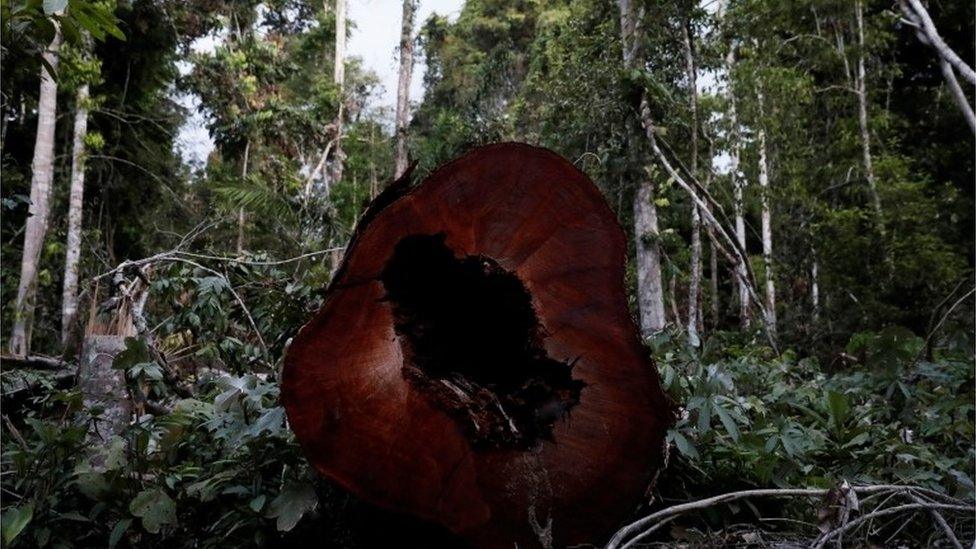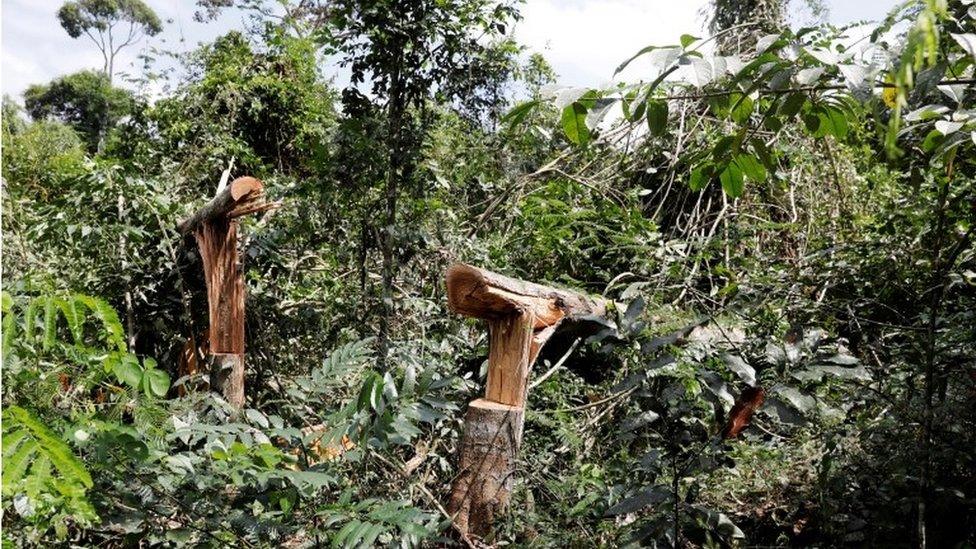Amazon fires: Brazil bans land clearance blazes for 60 days
- Published
"It's extremely upsetting... to see this kind of devastation" - the BBC's Will Grant flew over northern Rondonia state
Brazil has banned setting fires to clear land for 60 days in response to a massive increase in the number of fires in the Amazon rainforest.
The decree was signed by President Jair Bolsonaro, who has faced intense criticism at home and abroad for failing to protect the rainforest.
A leading Brazilian environmentalist warned on Wednesday that the "worst of the fire is yet to come".
South American countries will meet next week to discuss the crisis.
It remains unclear what impact the ban will have, as environmentalists say the overwhelming majority of forest clearance in the Brazilian Amazon is already illegal and enforcement is lax.
The Amazon - a vital carbon store that slows down the pace of global warming - has seen more than 80,000 fires break out so far this year - a 77% rise on the same period in 2018.
Environmentalists say the increase is due in part to policies enacted by Mr Bolsonaro's administration.
What is in the decree?
Prosecutors have been investigating allegations that some of the fires were triggered by the illegal clearing of land and the decree now bans setting fires for this purpose across the entire country.
It allows three exceptions: when fires are authorised by environmental authorities for reasons relating to plant health; as a preventative measure to fight wildfires; and as part of traditional subsistence agriculture practised by indigenous people.
Why the Amazon rainforest helps fight climate change
Why could 'the worst be yet to come'?
Writing in O Globo newspaper, Tasso Azevedo - who runs the deforestation monitoring group Mapbiomas - said those clearing the forest would cut down trees and vegetation before leaving it for a few weeks until it is drier and easier to set fire to.
The current fires were the result of forest clearing in April, May and June, he wrote, but the rate of clearing in July and August jumped sharply, external, suggesting that there was a lot of combustible fuel on the ground waiting to be ignited.

Trees are illegally felled and then left to dry before being set alight
Mr Azevedo called for a ban on the use of fire in the Amazon region until the end of the dry season in November.
He also called for urgent action to end deforestation, which he said was largely illegal and linked to criminal groups involved in timber theft, gold mining and land grabbing.
"What we are experiencing is a real crisis, which can turn into a tragedy that will feature fires much larger than the current ones if not stopped immediately," he said.
What else is Brazil doing?
With wildfires occurring across the globe, here are some of the techniques used to stop them
Mr Bolsonaro has accepted Chile's offer of four planes to fight the fires, the most in Brazil since 2010 - but he has refused a G7 offer of $22m (£18m) following a spat with French President Emmanuel Macron.
The government says it has deployed 44,000 soldiers to seven states to combat the fires. That came after Mr Bolsonaro last week said the authorities did not have the resources to fight the blazes.

The rate of tree-cutting jumped sharply in July and August, environmentalists say
The justice ministry says that federal police officers would be sent to the fire zones to assist other state agencies in combating "illegal deforestation".
On Monday Brazil's Defence Minister Fernando Azevedo e Silva told local media that the situation was "not simple, but it is under control and cooling down nicely".
Speaking to the BBC on Tuesday, former Brazilian president Luiz Inácio Lula da Silva, who is jail following corruption convictions, accused Mr Bolsonaro of "causing tremendous evil to Brazilian people".
Former Brazilian president Lula criticises Bolsonaro's handling of Amazon fires
Are there more fires than in recent years?
Data published by Brazil's space agency, external suggests there are. The agency, known as Inpe, says there have been more than 83,000 fires between 1 January 2019 and 27 August 2019. That is a 77% rise compared to the same period in 2018.



Nasa has also warned, external that the "2019 fires season has the highest fire count since 2012".
BBC analysis has also found that the high number of fires being recorded coincides with a sharp drop in fines being handed out for environmental violations.